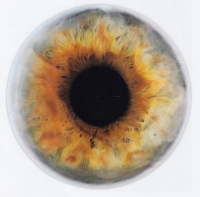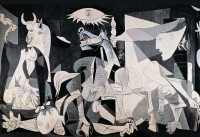29 Feb 2016
Re-writing Writers on Art
Years ago I thought that the Renaissance humanists who fought to have painting accepted as a liberal art knew a lot about the subject. It seemed a natural assumption but I was wrong. For us in search of art’s underlying meaning, it’s more im
21 Feb 2016
Harper Lee on Every Painter Paints Himself
Harper Lee’s passing reminded me of a deservedly famous line in To Kill A Mockingbird: "You never really understand a person… until you climb into his skin and walk around in it." To my mind she was not just portraying a wild imagination, as
29 Oct 2015
On Art’s Unity
If anyone doubts that there is more unity to visual art than is currently recognized or imagined, think about what Maya Angelou, the American poet, had to say about art in general. She was not given to hyperbole or exaggeration and chose her w
25 Mar 2015
Wisdom, Art and a Cat
I'm always on the lookout for written expressions of the basic ideas about visual art conveyed on EPPH. Here's one that backs up the concept that art and the practice of it leads to wisdom. A beautiful old Irish poem, now known as Pangur Bán af
06 Mar 2015
C.S. Lewis on a Poetic Method
The late Sidney Geist, a sculptor and controversial interpreter of Cézanne's art, invited me about 12 years ago to come and see him at his studio in Manhattan. I had spent the past year studying everything about Edouard Manet and was excited to
16 Jan 2015 | 2 Comments
The Centrality of Tools
Art sometimes seems like a meditation on the brush. Certainly visual metaphors for art's tools abound from, say, Edouard Manet’s early Boy with a Sword (in effect he holds a giant paintbrush, see explanation) to Diego Velazquez’s Portrait
29 Dec 2014
For how long have we read the Bible literally?
I learnt an astonishing fact today.1 The habit of reading the Bible as though it is historically true (especially the New Testament) started during the Protestant Reformation which began in 1517 and lasted more than a century. For the first 1,50
10 Dec 2014 | 1 Comments
Van Eyck’s Alpha and Omega
The world seems to work in our favor. Things happen which I used to call coincidence but which, in hindsight, are often far too fortuitous to be chance. Carl Jung described such events, at least the unusually important ones, as sy
05 Dec 2014 | 2 Comments
As in Painting, so is Poetry
The image above, a detail of a painting by Balthus called The Painter and His Model, goes particularly well with the poem below by James Merrill. Balthus, his head wrapped in a cloth to keep paint off his hair, seemingly pulls the curtain aside
08 Nov 2014
3 Practical Ways to Understand Art
How can museum visitors and art lovers interpret art for themselves without having the specialized knowledge of experts? It is easier than you think and within the grasp of many. The key is not in books but experience. And that would have been tru
28 Jul 2014 | 4 Comments
Ego’s Poetic Powers
EPPH has long argued that artists mute their ego to gain access to poetic depths. Yet in the passage below Colin Wilson, the English philosopher and novelist who died last year, describes a more balanced understanding in which poets identify wit
05 Jul 2014 | 1 Comments
Why art’s meaning repeats
There is never any new content in art [see definition below].1 Art’s meaning is true. Truth is constant. Thus, it must always be true. And it must always have been true, at least since the development of mankind. So, if art expresses fundament
13 Jan 2014
Good Art is Not Original
There are some no-nos on EPPH to make conventional minds scream. No biography. Who cares how many women Picasso lived with? It makes no difference to the meaning of Guernica or even to images nominally depicting his loves. No historical or liter
14 Oct 2013
The Error of Art History
Yesterday I wrote about how some errors make the world interesting and beautiful. This one does not.
Read the Journals of Ralph Waldo Emerson, who rarely saw great art, and you will learn about it on every page because the truths
21 Sep 2013
Pens, Palettes and their Visual Metaphors
Thoth was an Egyptian god best known in art as having the head of an ibis (above left). He had many functions but was perhaps most celebrated as the scribe of the gods, the inventor of heiroglyphs and writing, and who, when people died, wrote do
05 Jul 2013 | 3 Comments
Art’s Etymology
The successful Germans are not very popular at the moment in France, Italy and Great Britain, all suffering economically. But who do you think understands art better? Well, if language is anything to go by, it's not the Romance languages an
21 May 2013
Plays on the Mind
The Wall Street Journal recently reported that Richard Foreman, an experimental playwright for more than four decades "has presided over heady spectacles that mingle the conventions of theater with ... stroboscopic stage sets designed as embodim
11 May 2013
Emerson on Mind
When I started out I soon realized that every true work of art fulfilled the Renaissance saying that titles this site. EPPH, in short. Now, in more recent years, I have come to recognize that every artwork, like every church and temple from the
23 Mar 2013
Drawings as Ideas in the Mind
Concepto, concetto, esemplo, modello. Michael Cole and Mary Pardo, writing about the studio in the Italian Renaissance, have pointed out that the terms artists then used for a working drawing, what we today might call a sketch or study, were the
09 Mar 2013
Proust’s and Degas’ Disappearing Models
Literature and its methods are a useful yardstick by which to judge our knowledge and understanding of the visual arts. For instance, the known fact accepted by literary critics that many friends and acquaintances of Marcel Proust, the great Fre
13 Feb 2013
Logos (no, not that one!) and Art
Foreign words can sometimes sound more intellectual than those we use in English. That's why when logos is mentioned in reference to art it generally refers to the beginning of St. John's Gospel and is set in italic…"In the beginning
09 Nov 2012
Creation Theology
The painting above by an artist little known outside of Italy, Benedetto Bonfigli, is often titled The Annunciation of the Notaries and is dated to the middle of the fifteenth century. St. Luke who can be seen writing his gospel between the Virg
04 Nov 2012
Art and the Human Mind
Rumi was a mystical poet born in what is now Afghanistan in 1207 and died in 1273. The world has learnt little since about being human that Rumi did not already know and his ancestors long before him. Technology and science may be new and
06 Oct 2012 | 1 Comments
How Shakespeare Became a King
I demonstrated several years ago that many of the most iconic portraits of Europe's rulers, including those of many British kings and at least four of her queens, so closely resemble the artist's self-portrait that they are not portraits as we t
04 Aug 2012
Beauty is Truth, Truth Beauty
I've been reading the Bhagavad Gita, India's gift to the world, and discovering how the themes and principles of good living that Krishna teaches are remarkably similar to those that both Christ and Buddha taught centuries later. No-one
29 Jun 2012
Should we look for Originality or Similarity?
Some of the interpretations revealed here are so self-evident that you might wonder why art scholars never saw them before. I think there are many reasons but one is key. While we look for what art has in common with earlier art, academics tend
11 Apr 2012 | 2 Comments
Words on Words and Songs on Sound
My beat is art history and I’ve spent15 years reading nothing but non-fiction loosely or closely related to art. My knowledge of contemporary literature is tenuous at best; my familiarity with music worse but I have a belief ba
20 Jul 2011
A Musical Eco
Umberto Eco once wrote that “Every Broadway musical is, as a rule, nothing other than the story of how it is put on.”1 His insight into what the various plots have in common is striking because it is equally true of great paintings. The
09 Dec 2010
Exit the King
Anyone wondering why artists represent themselves as kings – why Fouquet painted himself in 1450 as Charles VII or Ingres as Napoleon or even Lucian Freud as Queen Elizabeth II - might like to read Eugène Ionesco&rsqu
The EPPH Blog features issues and commentary.





























